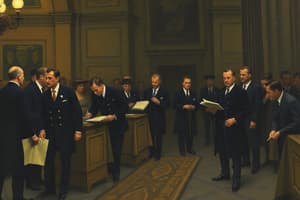Podcast
Questions and Answers
What were the three R's associated with the New Deal?
What were the three R's associated with the New Deal?
- Reconstruction, Reform, Regulation
- Redistribution, Restoration, Recovery
- Retention, Regulation, Reform
- Relief, Recovery, Reform (correct)
What was viewed as one of Hoover's most significant blunders during the Great Depression?
What was viewed as one of Hoover's most significant blunders during the Great Depression?
- His support for labor unions
- The implementation of the Smoot-Hawley Tariff (correct)
- His decision to increase taxes on the wealthy
- Refusing to provide direct relief to the unemployed
How did the congressional elections of 1934 impact the New Deal?
How did the congressional elections of 1934 impact the New Deal?
- They resulted in a significant loss of Democratic seats.
- They had no impact on the New Deal initiatives.
- They led to the establishment of new political parties.
- They solidified Democratic control and supported the New Deal policies. (correct)
What was the primary focus of the Wagner Act of 1935?
What was the primary focus of the Wagner Act of 1935?
What economic theory did Roosevelt incorporate into his policies during the New Deal?
What economic theory did Roosevelt incorporate into his policies during the New Deal?
Flashcards
What was the New Deal?
What was the New Deal?
The New Deal was a series of programs and reforms championed by President Franklin Delano Roosevelt in response to the Great Depression. It aimed to provide relief to struggling citizens, recover the economy, and reform the financial system.
What are the Three Rs of the New Deal?
What are the Three Rs of the New Deal?
The Three Rs of the New Deal refer to the program's core goals: Relief, Recovery, and Reform.
- Relief: Providing immediate aid to struggling citizens through programs like unemployment benefits and direct assistance.
- Recovery: Stimulating the economy through infrastructure projects, public works, and support for industries.
- Reform: Making long-term changes to prevent future economic crises by strengthening the banking system, regulating industries, and creating safety nets for workers.
Why was the Wagner Act so important?
Why was the Wagner Act so important?
The Wagner Act (National Labor Relations Act) of 1935 was a significant piece of legislation that established the right for workers to join labor unions and collectively bargain with their employers. It significantly strengthened the labor movement and improved working conditions for millions of Americans.
What was the impact of the Fair Labor Standards Act?
What was the impact of the Fair Labor Standards Act?
Signup and view all the flashcards
How did the New Deal change the relationship between government and society?
How did the New Deal change the relationship between government and society?
Signup and view all the flashcards
Study Notes
Great Depression & The New Deal (1929-1939)
- Economic Factor Contributing to the Depression: Students should analyze economic factors to determine the primary cause of the Depression.
- Effectiveness of Hoover's Policies: Evaluate the effectiveness of Herbert Hoover's policies and explain reasoning.
- Hoover's Worst Mistake: Identify and explain what was perceived as Hoover's biggest policy error. Justifications must be provided.
- Success of Hoover's Domestic Programs: Assess the success or failure of Hoover's domestic policy programs. Provide reasoning.
- New Deal Phases: Detail the number of phases the New Deal was divided into and list them.
- Three R's of the New Deal: Identify and define the three crucial goals of the New Deal.
- Agencies Created During Roosevelt's First 100 Days: List the agencies formed during Franklin D. Roosevelt's first 100 days in office.
- Importance of the 1934 Congressional Elections: Examine the significance of the 1934 congressional elections.
- Wagner Act (1935): Assess the importance and impact of the 1935 Wagner Act. References to additional information from page 5 are required.
- New Deal's Momentum Loss (Late 1930s): Provide a rationale for the waning influence of the New Deal towards the end of the 1930s.
- Adoption of Keynesian Economics by FDR: Specify when Franklin D. Roosevelt adopted Keynesian economic principles.
- Impact of the 1936 Presidential Election: Explain how the 1936 presidential election influenced Roosevelt's Court Reorganization Plan.
- Fair Labor Standards Act (1938): Describe the impact of the 1938 Fair Labor Standards Act and its connection to earlier labor movements.
- Impact of FDR on Government-Society Relationship: Detail how Franklin D. Roosevelt altered the relationship between government and society.
- Positive or Detrimental Effects of the New Deal: Evaluate whether the New Deal had a positive or negative effect on American society. Justify your response.
Studying That Suits You
Use AI to generate personalized quizzes and flashcards to suit your learning preferences.




